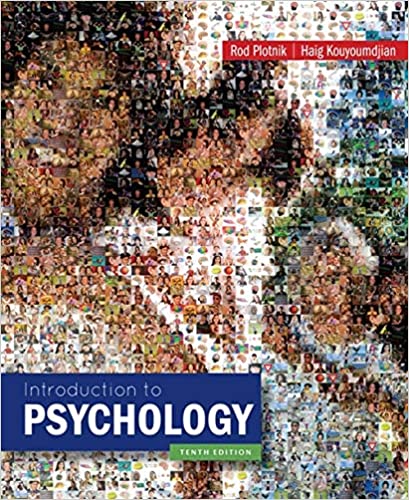
Introduction to Psychology 10th Edition by Rod Plotnik,Haig Kouyoumdjian
Edition 10ISBN: 978-1133939535
Introduction to Psychology 10th Edition by Rod Plotnik,Haig Kouyoumdjian
Edition 10ISBN: 978-1133939535 Exercise 38
Using Money to Motivate Kids to Learn
Beginning when children are very young, we reward them for good behavior. We may give them a sticker for using the toilet or a cookie for cleaning up their bedroom. As children get older, some parents may reward them for getting good grades in school by giving them cash.
Decades of research show that providing children with rewards is an effective way to motivate them to perform desirable behaviors. Yet, there is much controversy about using monetary rewards in our educational system. Roland Fryer, Jr., a Harvard professor, boldly suggests that schools use cash as a way to motivate students to attend classes, complete their homework, and obtain high scores on standardized tests. Opponents state that students should learn for the love of learning, rather than for monetary rewards. These individuals fear that money will cheapen the act of learning and that students will stop learning when the rewards eventually go away.
Despite widespread resistance, Fryer was determined to find out if his proposed system would work. He designed and carried out ambitious experiments involving thousands of children of varying ages in schools across the country. In his studies, some groups of children would earn money for performance on desired behaviors (such as reading, grades, and test scores) and other groups would not be paid for any performance.
In one of the experimental conditions, children were paid for achieving high test scores, and the results showed that money did not improve learning or grades. In a second condition, students were paid for earning good grades, and the results showed that there was an improvement in attendance and grades, but no change in standardized test scores. In a third condition, paying children on a routine basis for small accomplishments, such as attendance and behavior, resulted in increased standardized reading test scores. Last, in the fourth condition, paying students to read books dramatically improved their reading comprehension and standardized test scores, and these children continued to perform better the following year, long after the monetary rewards had ended.
Fryer explains that the reason the improvement was highest in the last condition was likely because students were frequently rewarded for a specific behavior that is known to improve learning-reading books. It's quite possible that many students do not really know what type of work and effort are required to learn more and perform better on assessments. The results are as strong as or even stronger than the results of studies showing the benefits of decreasing class size and enrolling students in early education intervention programs, which actually cost much more than the financial reward system used by Fryer.
In response to those who criticize Fryer's efforts because they want children to learn for the love of learning, Fryer begins by agreeing with them, but states that for that to happen, we must begin by getting students involved in learning. His research data supports his position. Remember that children continued to perform better on reading tests even during the year after the monetary reward system ended. Last, Fryer reminds us that as adults, many of us work mostly for money, so it doesn't seem fair to hold kids to a higher standard than we hold for ourselves.
Question
What are the experimental and control groups in these studies? What are the independent and dependent variables?
Beginning when children are very young, we reward them for good behavior. We may give them a sticker for using the toilet or a cookie for cleaning up their bedroom. As children get older, some parents may reward them for getting good grades in school by giving them cash.
Decades of research show that providing children with rewards is an effective way to motivate them to perform desirable behaviors. Yet, there is much controversy about using monetary rewards in our educational system. Roland Fryer, Jr., a Harvard professor, boldly suggests that schools use cash as a way to motivate students to attend classes, complete their homework, and obtain high scores on standardized tests. Opponents state that students should learn for the love of learning, rather than for monetary rewards. These individuals fear that money will cheapen the act of learning and that students will stop learning when the rewards eventually go away.
Despite widespread resistance, Fryer was determined to find out if his proposed system would work. He designed and carried out ambitious experiments involving thousands of children of varying ages in schools across the country. In his studies, some groups of children would earn money for performance on desired behaviors (such as reading, grades, and test scores) and other groups would not be paid for any performance.
In one of the experimental conditions, children were paid for achieving high test scores, and the results showed that money did not improve learning or grades. In a second condition, students were paid for earning good grades, and the results showed that there was an improvement in attendance and grades, but no change in standardized test scores. In a third condition, paying children on a routine basis for small accomplishments, such as attendance and behavior, resulted in increased standardized reading test scores. Last, in the fourth condition, paying students to read books dramatically improved their reading comprehension and standardized test scores, and these children continued to perform better the following year, long after the monetary rewards had ended.
Fryer explains that the reason the improvement was highest in the last condition was likely because students were frequently rewarded for a specific behavior that is known to improve learning-reading books. It's quite possible that many students do not really know what type of work and effort are required to learn more and perform better on assessments. The results are as strong as or even stronger than the results of studies showing the benefits of decreasing class size and enrolling students in early education intervention programs, which actually cost much more than the financial reward system used by Fryer.
In response to those who criticize Fryer's efforts because they want children to learn for the love of learning, Fryer begins by agreeing with them, but states that for that to happen, we must begin by getting students involved in learning. His research data supports his position. Remember that children continued to perform better on reading tests even during the year after the monetary reward system ended. Last, Fryer reminds us that as adults, many of us work mostly for money, so it doesn't seem fair to hold kids to a higher standard than we hold for ourselves.

Question
What are the experimental and control groups in these studies? What are the independent and dependent variables?
Explanation
In the given study, Roland Fryer, a prof...
Introduction to Psychology 10th Edition by Rod Plotnik,Haig Kouyoumdjian
Why don’t you like this exercise?
Other Minimum 8 character and maximum 255 character
Character 255


